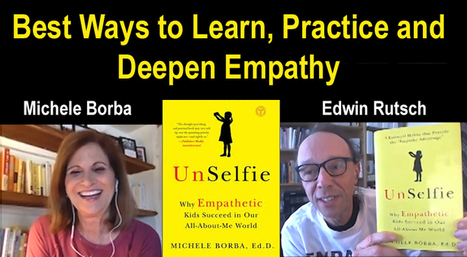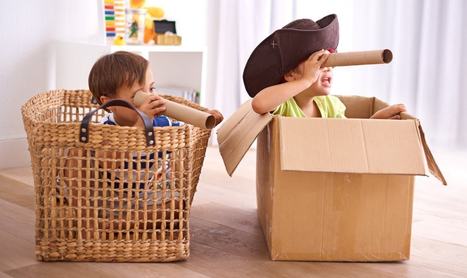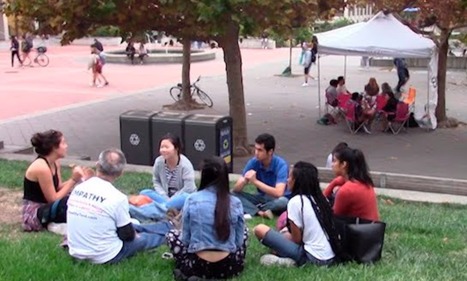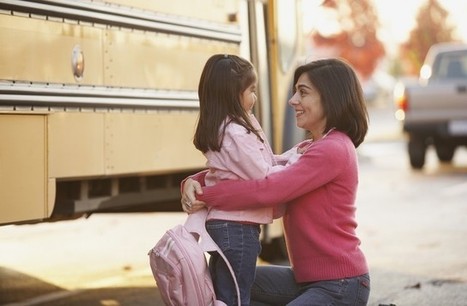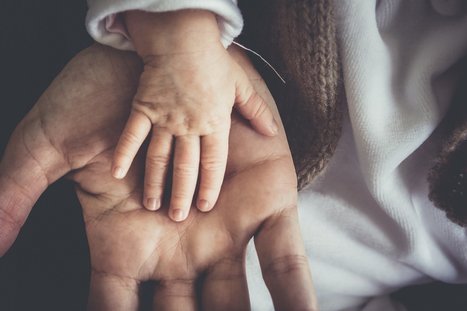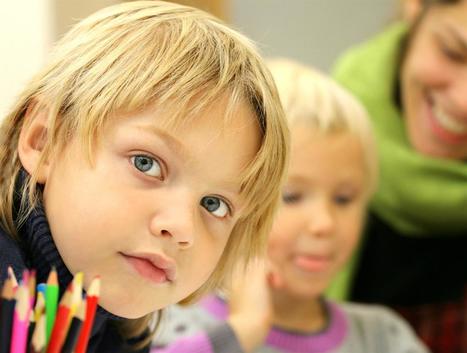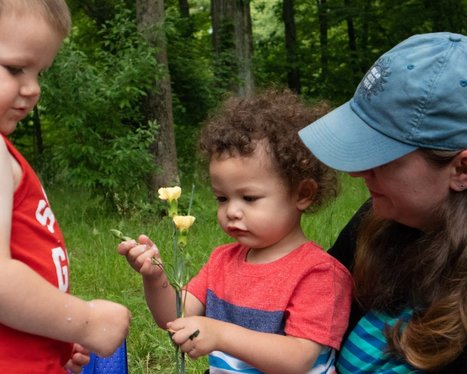 Your new post is loading...
 Your new post is loading...

|
Rescooped by
Edwin Rutsch
from Empathy Movement Magazine
July 29, 2019 9:21 PM
|
Empathy is something easily taken for granted. Not everyone possesses or exhibits empathy and few actually exhibit the right amount of empathy. Empathy is a skill that is learned over time.
There are ways to help even the youngest children display greater empathy toward other children as well as adults. As their parent, you can:
Be an example. It’s easy to get caught up in this “do as I say, not as I do” mentality, but that doesn’t work well in creating empathy. Lead by example.
Be mindful of your child’s emotions. If we don’t respect our children’s emotions, how can we teach them to respect others?

|
Rescooped by
Edwin Rutsch
from Empathy Movement Magazine
July 24, 2019 1:28 PM
|
Empathy is one of the vital steps towards cultivating humanity. Read on to learn the 5 ways you can teach empathy to your kids.

|
Rescooped by
Edwin Rutsch
from Empathy Movement Magazine
July 1, 2019 9:09 PM
|
If you have been in a relationship for any length of time, you undoubtedly understand how fulfilling they can be; however, they require hard work, empathy, and commitment from both parties.
Communication and empathy are two great ways to strengthen a relationship. Why? These qualities allow you to have a deeper and more meaningful connection. Now that we have a general understanding of the importance of empathy in your relationship, let’s turn our attention towards steps that you can take towards becoming a more empathetic partner:
- 1. KEEPING THE LINE OF COMMUNICATION OPEN...
- 2. SEEING THINGS FROM THEIR PERSPECTIVE...
- 3. ASK QUESTIONS...
- 4. AVOID PASSING JUDGMENT...
- 5. DIVIDE THE WORKLOAD...
- 6. ACKNOWLEDGE THE WANTS AND NEEDS OF YOUR PARTNER...
- 7. SET ASIDE TIME TO BECOME A BETTER EMPATH...
- 8. BE “PRESENT” IN YOUR RELATIONSHIP...

|
Rescooped by
Edwin Rutsch
from Empathy Movement Magazine
June 22, 2019 10:11 PM
|
Michele Borba, is an internationally renowned educational psychologist and an expert in parenting, bullying, and character development. She is an award-winning author of twenty-two books translated into fourteen languages.
One of the foremost authorities on childhood development in the country, she is a regular NBC contributor who appears regularly on Today and has been featured as an expert on Dateline, The View, Dr. Phil, NBC Nightly News, Fox & Friends, Dr. Oz, and The Early Show, among many others. She is author of, UnSelfie: Why Empathetic Kids Succeed in Our All-About-Me World.
"Empathy is the root of humanity and the foundation that helps our children become good, caring people. But the Empathy Advantage also gives them a huge edge at happiness and success."

|
Rescooped by
Edwin Rutsch
from Empathy Movement Magazine
May 28, 2019 8:15 PM
|
When people are feeling happy, upset or even angry, we try to understand their feelings by putting ourselves in their shoes. Often, the other person's feelings can also inspire your sympathy. This is known as empathy. Empathy is an important quality which makes us less inclined to get into an argument or become aggressive and more inclined to help others. Dr Van der Graaff and her team are investigating the role that young people's relationships with their parents and peers play in these changes in empathy. They are also examining the relationship between boys' empathy skills and how well they function within their family, at school and in society.

|
Rescooped by
Edwin Rutsch
from Empathy Movement Magazine
May 18, 2019 11:38 AM
|
How? Think about it this way. Each time your children “play pretend,” they have to imagine how another person would think and feel, and then act accordingly. Like striking the confident pose of a superhero, or forgetting how to walk and talk like a baby, or adopting an oh-so-fancy accent and extended pinky finger to have tea with the queen. Although acting may just seem like a fun game to your kids, it’s also giving them amazing practice at understanding people and developing empathy.

|
Rescooped by
Edwin Rutsch
from Empathy Movement Magazine
April 14, 2019 8:50 PM
|
When a parent bestows the gift of empathy on a child, that visceral connection changes everything.
I see parents and children make breakthroughs every day. And guess what makes the most difference? Empathy. If we can actually see things from our child's perspective, everything changes.
This doesn't mean agreeing with our child, or letting him do whatever he wants just because we understand why he wants to. But it does mean that while our child doesn't get everything she wants, she gets something better: Someone who understands and accepts her, no matter what. It also means that once we understand our child's perspective, we can intervene to help her meet the needs that she was trying to meet all along, from connection to feeling valued.

|
Rescooped by
Edwin Rutsch
from Empathy Movement Magazine
March 10, 2019 8:12 PM
|
"In the last few years, I’ve been exploring the use of Empathy Circles with some of my organizational clients, with facilitator learning groups, and in communication workshops. I’ve been finding that it is a great introduction and warm-up for Dynamic Facilitation, one of my core practices, as it offers everyone in the room the opportunity to engage in offering listening reflections to one another. At the same time, I’m totally excited to see that Edwin Rutsch, the creator of Empathy Circles, has been bringing his work into the arena healing political divides. My experience is that this simple-yet-powerful form is actually quite revolutionary, in the best sense of the word, and so I want to delve a bit into what I see as the underlying dynamics. But first, a brief description, followed by a distinction and clarification…" by Rosa Zubizarreta
March 9, 2019

|
Rescooped by
Edwin Rutsch
from Empathy Movement Magazine
January 29, 2019 2:04 PM
|
In general, this rise in emotional intensity occurs more quickly during couples’ disagreements than it does in other relationship disagreements, such as with co-workers. Once escalation occurs, it is often an uphill struggle for at least one of the partners to regain emotional self-control. It is clearly to the advantage of both individuals to avoid the escalation, or to de-escalate as soon as possible when it does occur. In my clinical work with couples, I guide them in practicing two critical skill sets for resolving conflicts: - 1. preventing the escalation of emotions through the use of empathic responses, and
- 2. De-escalating as soon as possible through the use of self-calming skills. The importance of empathic responses was also described by Dr. Leon Seltzer

|
Rescooped by
Edwin Rutsch
from Empathy Movement Magazine
January 29, 2019 12:57 AM
|
In general, this rise in emotional intensity occurs more quickly during couples’ disagreements than it does in other relationship disagreements, such as with co-workers. Once escalation occurs, it is often an uphill struggle for at least one of the partners to regain emotional self-control. It is clearly to the advantage of both individuals to avoid the escalation, or to de-escalate as soon as possible when it does occur. In my clinical work with couples, I guide them in practicing two critical skill sets for resolving conflicts: - 1. preventing the escalation of emotions through the use of empathic responses, and
- 2. De-escalating as soon as possible through the use of self-calming skills. The importance of empathic responses was also described by Dr. Leon Seltzer

|
Scooped by
Edwin Rutsch
January 14, 2019 12:01 PM
|
Different Intents in Different Forms of Empathic Responses
Empathic understanding responses are simple responses that convey simple understanding, acceptance, and concern about what the client has said. This is a supportive response that implicitly asks the client to share more of her experience and to explore and reflect on her perceptions and bodily sensations. Empathic affirmations are responses intended to validate the client's perspective. Empathic evocations are responses that are used to bring clients' experiences and emotions alive in the session. Empathic exploration responses focus on exploration and have a probing, tentative quality to examine the hidden depths of clients' experiences Empathic conjecture are attempts by the therapist to articulate that which is implicit in clients' narratives, especially with respect to how clients are feeling or experiencing certain events. Empathic refocusing responses, while staying within clients' frames of reference, reveal an alternative perspective. Empathic doubling responses are attempts to voice clients' thoughts and feelings as they focus on and try to articulate the impact of events.

|
Rescooped by
Edwin Rutsch
from Empathy Movement Magazine
January 14, 2019 12:54 AM
|
WHEN I WORKED AS A school-based therapist, meeting with small groups of kids –often girls – was a regular occurrence. The great benefit of having therapists on campus was that kids didn’t have to sit with uncomfortable emotions throughout the day. They could, and did, seek help when needed.
On one particular day, three middle school girls collapsed on my couch and began to vent their frustrations about a peer. The peer in question had a tendency to both seek attention from the group at all times and interrupt frequently should the attention of the group shift away from her. They were tired of it, and they wanted me to help them figure out a way to talk to their peer about these issues without her “falling apar

|
Rescooped by
Edwin Rutsch
from Empathy Movement Magazine
January 3, 2019 5:40 PM
|
The skills of empathy, creativity, and self-control are interconnected. Each skill bleeds over into the other skills, so building ability in one area will translate to greater ability in the other two. We can use things we're already doing as parents in a different way to foster not only empathy but also the related skills of creativity and self-control. The most important thing you can do to grow compassionate kids is to intentionally focus on these skills daily in tiny ways.
|

|
Rescooped by
Edwin Rutsch
from Empathy Movement Magazine
July 29, 2019 9:20 PM
|
"The findings indicate that even during a baby's first year, the infant is already sensitive to others' feelings and can draw complicated conclusions about the context of a particular emotional display," says Dr. Florina Uzefovsky, head of the BGU Bio-Empathy Lab, and senior lecturer in BGU's department of psychology and the Zlotowski Center for Neuroscience. "Even during the first year of life, babies are able to identify figures who "deserve" empathy and which ones do not, and if it appears that there is no justification for the other one's distress, no preference is shown."

|
Rescooped by
Edwin Rutsch
from Empathy Movement Magazine
July 2, 2019 8:17 PM
|
Is this something only parents can do? I don’t think so. However, I believe empathy is best learned at home, around the people children spend the most time with.
1. Show Empathy Towards Your Child
Children learn by example, so if you want your children to behave a certain way, it is important to act as a mirror.
If you hope for your children to become empathetic, it is crucial that you treat situations with them, with empathy. Always be open to see things from your child’s perspective, and think of how they are feeling.
If your child seems upset, try getting to the root of the problem, making sure they feel heard and understood. If harsh words are used or they are treated poorly, always be sure to apologize.

|
Rescooped by
Edwin Rutsch
from Empathy Movement Magazine
July 1, 2019 9:09 PM
|
Empathic parenting involves all of the above. To maintain a close bond with my children, it is essential for me to focus on being lovingly responsive in my interactions with them. - I want to relate well with them, sense what they are feeling, help them put their thoughts and feelings into words, and anticipate their reactions as well as their needs.
- I want to stop, get down to their level, look lovingly in their eyes, and give them my full attention. ''
- I need to listen, listen, listen, help them to feel understood, and accept them for the unique individuals they are.
- I must keep my own emotional world separate from theirs.
- I have to be flexible and willing to adjust my language, thoughts, and actions, and to admit my mistakes.
- Ineed to be able to step back and reflect on the events of the day, acknowledge the ways in which I offered my children unconditional support and love, and consider ways I might be able to maintain connection with greater ease.
My children rely on my ability to connect―and to re-connect―with them.They instinctively know that their coping abilities, and even their survival, depend on a strong connection with me. by Tamara Parnay

|
Rescooped by
Edwin Rutsch
from Empathy Movement Magazine
June 8, 2019 5:40 PM
|
Denmark is one of the happiest countries in the world. This is according to the UN’s World Happiness Report, an important survey that since 2012 classifies the happiness of 155 countries in the world, and that for seven years has placed Denmark among the top three happiest countries on a global level. The fact that teaching empathy has been mandatory since 1993 in schools in Denmark is a factor that contributes to the happiness of the country.
Empathy helps build relationships, prevent bullying and succeed at work. It promotes the growth of leaders, entrepreneurs and managers. “Empathic teenagers” tend to be more successful because they are more oriented towards the goals compared to their more narcissistic peers.

|
Rescooped by
Edwin Rutsch
from Empathy Movement Magazine
May 28, 2019 8:14 PM
|
Finding an empathic partner is a blessing in disguise. It feels great to fall in love with someone who appreciates you. Here are 5 benefits of being an empathic partner
1. Less frustration
An empathic partner will not stress you because of stupid things. You will feel loved and cared for. It feels great to date someone who rarely wants to hurt you in any way...
2. Better understanding... 3. Makes you feel listened to... 4. Experience great appreciation.. 5. Mutual trust... by Adonijah Nziwa

|
Rescooped by
Edwin Rutsch
from Empathy Movement Magazine
May 16, 2019 1:03 AM
|
In our previous post, we shared with you some helpful posts on how you can be a catalyst of change in other people’s lives and passing this on to your children. Empathy is such a life-giving character that our Charity Organization in Indianapolis, Indiana strives to practice this virtue in every opportunity presented to us.
Thankfully, your role as a parent can be a great contribution in the way your child develops towards an empathic person. Hereon, let’s share with you some more tips on how you can influence your little one to this empowering virtue.

|
Rescooped by
Edwin Rutsch
from Empathy Movement Magazine
April 4, 2019 2:11 PM
|
So, what is affective empathy?
Affective empathy is the ability to sense the emotions that another person is feeling. You experience affective empathy when you tear up at a sad movie or feel elated for the player who just scored the winning goal.
This processing of emotions plays out in the limbic system, a part of the brain that develops early in life, making early childhood a perfect time to support affective empathy. We can cultivate this natural ability in our kids in simple ways every day. Here are just a few that have made all the difference for our kids and us:

|
Rescooped by
Edwin Rutsch
from Empathy Movement Magazine
February 28, 2019 1:45 AM
|
Empathy, the ability to understand others and feel compassion for them, is arguably the most defining human quality – setting us apart from smart machines and even other animals. Without it, we couldn’t function in social areas such as the schools, court rooms and office workplaces that are the cornerstones of our society.
But babies and toddlers are generally poor at showing sensitivity to other people’s feelings. So how do they develop this crucial skill – do they learn it gradually or is it just an innate ability that kicks in at a certain age?
Empathy involves being sensitive to the emotions of others, understanding those emotions and responding in an appropriate way. Studies on how empathy develops need to look at how children understand and respond to emotions rather than their ability to recognise them. This is because children who have difficulties with empathy generally have little or no difficulty in identifying emotional reactions in others, but rather in understanding the purpose or cause of it.

|
Scooped by
Edwin Rutsch
January 29, 2019 2:10 AM
|
Empathy is the cornerstone of any relationship for a very simple reason: most people, like myself, crave understanding and affirmation from other people. Without empathy, it is harder to understand or affirm those around you.
Empathy not only connects us to other people, but it connects us to ourselves. We can learn a lot about our own emotions by learning and being conscious of the emotions of others. When we lack empathy for other people, we also lack empathy for ourselves.
I’m going to start implementing my resolution with the best tool I have: the communication and the language I choose to use.
In today’s culture, I see a lot of language surrounding self-care. I also see a lot of languages promoting what I view as a lack of empathy for others. I constantly see posts which

|
Rescooped by
Edwin Rutsch
from Empathy Movement Magazine
January 22, 2019 2:11 PM
|
Let's say you tell your child that it's time for bed, and she ignores you or says NO! What are your choices?
Threaten or punish her. You have to keep escalating, it ruins everyone's evening, and it erodes your relationship with your child.
Let her do whatever she wants. You're compromising on what's good for your child and the rest of the family. Until you explode, eventually....Not exactly responsible or peaceful parenting!
Set a limit -- with empathy. Say "You really don't want to stop playing....I hear you. It's hard to stop. I bet when you grow up, you'll play all night, every night, won't you? AND right now, it's time to get ready for bed....Do you want to fly your plane to the bathroom, or climb on my back and I'll gallop you there?"

|
Rescooped by
Edwin Rutsch
from Empathy Movement Magazine
January 14, 2019 12:54 AM
|
Raising empathetic kids is actually pretty easy, but it requires being thoughtful about others, modeling important behaviors, and being patient with your kid. Empathy is an important trait for parents to nurture in their kids. Empathetic children, kids who naturally have the ability to understand and even share in the feelings of others, tend to build healthy relationships throughout all stages of life. Fortunately, this trait arrives early and naturally. Recent research done by Alison Gopnik, a renowned child psychiatrist, shows that empathy can even be observed in babies, who pat other babies when they cry. Still, parents can’t just let well enough alone. They need to encourage their children to think about the feelings of others while also considering their own needs and desires. Why Empathy Matters
Empathy is key to understanding the world. It helps us connect with others and build relationships with everyone and everything.

|
Rescooped by
Edwin Rutsch
from Empathy Movement Magazine
January 13, 2019 11:02 PM
|
Raising empathetic kids is actually pretty easy, but it requires being thoughtful about others, modeling important behaviors, and being patient with your kid. Empathy is an important trait for parents to nurture in their kids. Empathetic children, kids who naturally have the ability to understand and even share in the feelings of others, tend to build healthy relationships throughout all stages of life. Fortunately, this trait arrives early and naturally. Recent research done by Alison Gopnik, a renowned child psychiatrist, shows that empathy can even be observed in babies, who pat other babies when they cry. Still, parents can’t just let well enough alone. They need to encourage their children to think about the feelings of others while also considering their own needs and desires. Why Empathy Matters
Empathy is key to understanding the world. It helps us connect with others and build relationships with everyone and everything.
|




 Your new post is loading...
Your new post is loading...




